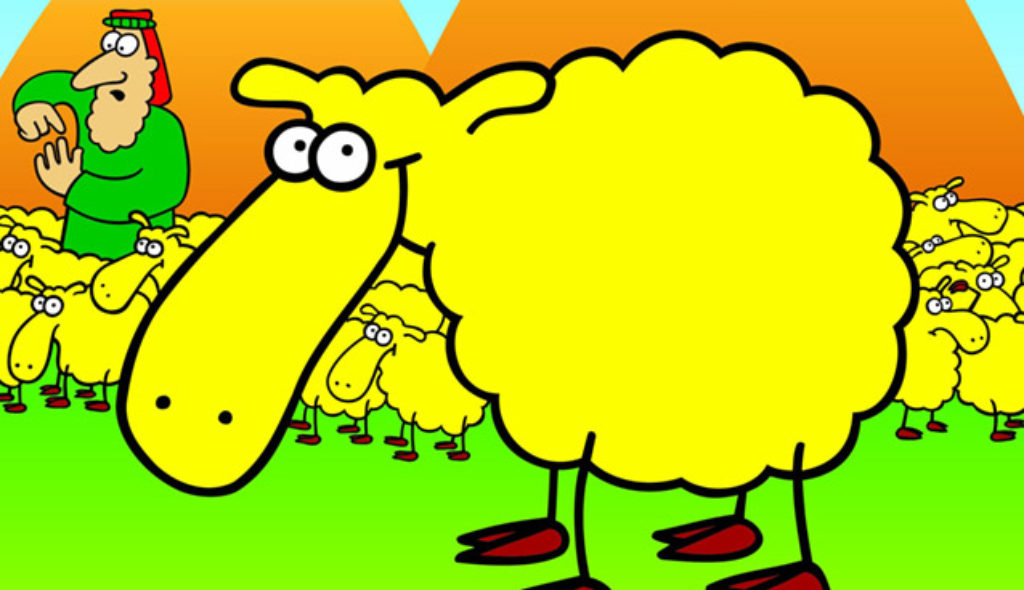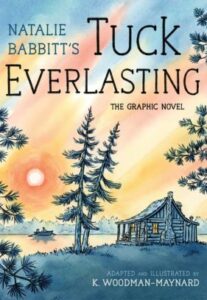Listed in alphabetical order:
Along Came You
by Karona Drummond (author); Estelle Corke (illustrator)
Summary: A mother compares her life before the arrival of her child to family life after her child enters the family in the areas of decorations, noise, companionship, activities, outings, books, sleeping, and the joy found in watching the child grow.
Christian beliefs: The importance of a child is based on Psalm 127:3.
Authority roles: The mother in this book extols her joy at having a child and being in relationship with the child on a daily basis. The illustrations show the mother supervising the child’s activities and not becoming upset or worried over the many changes that have taken place in her formerly well-ordered life. Although this mother remains the authority figure as a parent, she interacts with her child in a way that the child can appreciate and may remember.
The Berenstain Bears
Love Their Neighbors
created by Jan & Mike Berenstain
Summary: The Bear family demonstrates good stewardship by keeping their house clean and well maintained. Most of their neighbors do the same, but the Bogg brothers don’t. They have a run-down, messy place, and Mama and Papa Bear do not approve of these neighbors.
On the Bear family’s way to a town festival celebrating their neighborhoods, their car breaks down. The Mayor and Mrs. Honeypot drive by. The Mayor is leading the festival, and they’re late, so they can’t stop to help. The Squire and Lady Grizzly drive by. They, too, are late. Lady Grizzly is the flower-arranging contest judge, so they can’t stop to help. The Bogg brothers stop and help the Bear family — towing the vehicle to a gas station and fixing the car.
When the Bogg brothers won’t take money for their services, Papa Bear invites them to the town’s festival, and Mama Bear invites them over for dinner the following week. The Bogg brothers accept both invitations.
Christian beliefs: The story is a loose allegory of the parable that Jesus told about the good Samaritan when someone asked Jesus who was his neighbor (Luke 10:25-37).
Authority roles: Mama and Papa Bear are good stewards of their home and their things. Their children follow their example. When Mama and Papa realize that they have been wrong to judge the Bogg brothers, they act neighborly toward them.
Cecil The Lost Sheep
created by Andrew McDonough (author/illustrator)
Summary: Cecil the sheep grows bored of being a part of a 100-sheep flock. He escapes and climbs a steep mountain. He eventually gets stuck on a cliff on the mountainside. Although he wants help, he doesn’t cry for it because he is afraid the shepherd will be angry with him. When the shepherd notices Cecil is missing, he leaves his flock of 99 sheep and searches until he finds Cecil. Instead of being angry, the shepherd is so happy that he has found Cecil that he throws a party that Cecil and the other sheep get to enjoy.
Christian beliefs: This humorous rendition of the parable about the good Shepherd is based on Luke 15:1-7.
Authority roles: The shepherd knows each sheep by name and each sheep is important to him. He will search for lost sheep, even when it’s the sheep’s fault that it is lost. When a sheep returns to the fold, the shepherd celebrates.
God Is With Me
Through the Day
written by Julie Cantrell
Summary: The words and photographs in this picture book demonstrate how God’s love makes the world a less fearful place. The text reminds children that God loves them and that they can trust in God no matter how they are feeling. To do this, the book pairs simple words with animal photographs. For example, to demonstrate that children wake up and stretch, a bear is shown stretching. The photograph of a rodent safe in a tree’s knothole represents the security children may feel in their homes. Some of the childhood emotions covered are loneliness (demonstrated by a raccoon hiding in a bush) and how small a mouse feels in a great big world. The book ends with an encouragement to children to remember that God is with them, just as He was with David and Jonah in the Bible stories they hear.
Christian beliefs: Children are encouraged to bring their emotions before God and trust in Him even when scared (Psalm 56:3). God is seen as strong, omnipresent, comforting, safe and full of love for the reader.
Authority roles: A mother penguin is touching its youngster as if it were kissing it. A spotted leopard cub is seen as cuddling with its parent. A mother polar bear protects its cub. A baby monkey trustingly looks up at its parent.
Meet Genna and Russ, The Generous Kids
by Sarah Wilson (author); Terry Taylor (illustrator)
Summary: Genna and Russ are twins. They enjoy doing many things, such as swimming, hiking, playing soccer, skating, biking, caring and sharing. They read books to younger animals, help friends out of tough places, introduce themselves to new people, help others with work, donate clothes and cheer up friends. Because of this, they are a part of the Generous Kids Club.
Christian beliefs: No Scriptures are given, but the general principle of loving your neighbor is described.
Authority roles: Although Genna and Russ help an adult with his garden, this book is solely focused on children and what they can do for each other.
My Dad and Me
by Alyssa Satin Capucilli (author); Susan Mitchell (illustrator)
Summary: In the autumn, a girl and her dad rake leaves and play in them. In the winter, a boy and his papi (Spanish for father) play in the snow, make large snowballs and sled when they are alone together. A girl and her aba (Hebrew for father) hike, bike and relax together in the spring. During the summer, a boy and his bábá (Mandarin for father) go to the beach to look at shells, play in the waves and go in a boat together. A girl and her bapa (the Hindi word for father) enjoy being together. At the end, a young boy snuggles in his father’s lap. The whole book centers on the special relationship between a child and his or her father.
Christian beliefs: None, but the principle of children looking up to their parents with respect is present.
Authority roles: The father’s place as a role model in his child’s life, amid different cultural backgrounds, is emphasized.
The Tallest of Smalls
by Max Lucado (author); Maria Monescillo (illustrator)
Summary: Each night, a certain number of names are called in Stiltsville. People want their name called because it means that they may be the best at something — the prettiest, cleverest or funniest. These special people receive stilts.
One night, Ollie was chosen, and the town cheered for him. He became extremely popular as he stood on his new stilts. He enjoyed the prestige, until birds started nesting on him because he was so high in the air. Their nesting made him fall to the ground where he used to live. As soon as he fell, his stilts were removed. This upset him until Jesus came and told Ollie that he was precious, not because he did or did not have stilts, but because he belonged to Jesus. Jesus taught Ollie that he was the “tallest of talls” because of Jesus’ love.
Christian beliefs: The message in this book is a reminder that children are special and that Jesus loves them. It is written to reinforce the idea that a person’s significance comes from God, not his culture or what he does well.
Authority roles: Those in authority in Stiltsville use their position to give fame to some and look down on others. Jesus accepts Ollie as belonging to Him, regardless of whether he is popular with others.
Waddle
by Rufus Butler Seder
Summary: Children are asked if they can waddle, stomp, prance, hop, slither, flap, scamper or leap like various animals, such as a penguin, frog, pig, elephant, snake, bird, bear or dolphin. On the page opposite each question is an animal that performs the action specified, actually moving (using Scanimation) as the page is turned.
Christian beliefs: None
Authority roles: None, although the reader, who is probably the parent, is asking these questions, so there is an interactive element to this Scanimation picture book.
When I Grow Up
by Leonid Gore (author/illustrator)
Summary: A young boy wants to know what he will be when he grows up. A raindrop will one day be a river and thinks that perhaps that is what the boy will be. A green sprout suggests that the boy may follow his lead and become a tall tree. A caterpillar thinks the boy may become a butterfly like it will. A chick says it will become a rooster, so perhaps the boy will, also. A shadow says that it will eventually grow into the night; perhaps the boy will also be a part of the night. The boy decides that when he grows up, he will be just like his daddy.
Christian beliefs: None
Authority roles: In the opening and closing pages, a young boy interacts with his father as a young boy would with a parent and his role model. The author captures the pride a youngster has in the idea of becoming just like his father.
Yes Day!
by Amy Krouse Rosenthal (author); Tom Lichtenheld (illustrator)
Summary: This illustrated picture book explores the idea of a holiday called Yes Day, when any yes/no question the child asks is given a yes response. The main character wants pizza for breakfast, to use hair gel, clean his room another day, choose what to buy at the grocery store, have ice cream, eat lunch outside, have a food fight, invent his own game, take a piggyback ride with Dad, have a friend over for dinner and stay up late. But the day does come to an end, and the child can’t wait until this day comes again the following year. On the inside cover of the book are calendar squares that show other days, such as Maybe Tomorrow Day, We’ll See Day, Not Today Day, You Gotta Be Kidding Me Day, Go Ask Your Father Day, Go Ask Your Mother Day, As-a-matter-of-fact-I-am-the-boss-of-you-and-I-said-no Day, Talk Backwards Day, and many more. The book seems to suggest that with all the no’s a child receives during the course of a normal day, sometimes it’s good for him to have an occasional Yes Day.
Christian beliefs: None
Authority roles: Although this book is from the child’s perspective, the main character knows he must ask his parents’ permission, and it’s up to them to say yes. His parents are shown as reasonable and ready to celebrate Yes Day with him, even though the cover flaps show that from a child’s perspective, he has a lot of no’s in his life. The child asks for reasonable things, which makes the reader tend to think that his parents are raising him well. Throughout, the child shows how he likes interacting with his family, and the book gives the idea that occasionally, it’s OK to do things differently, even if it’s messier or doesn’t fit into the daily routine.









